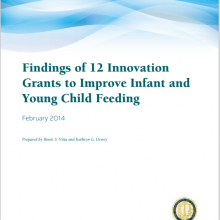Journal article
Jan 17 2023

'First do no harm' overlooked: Analysis of COVID-19 clinical guidance for maternal and newborn care from 101 countries shows breastfeeding widely undermined (Gribble K, Cashin J, et al, 2023)
Despite WHO recommendations, many COVID-19 maternal and newborn care guidelines failed to recommend skin-to-skin contact, rooming-in, and breastfeeding as the standard of care.
Journal article
Apr 26 2021

Misalignment of global COVID-19 breastfeeding and newborn care guidelines with World Health Organization recommendations (Hoang, D.V., 2020. BMJ Nutrition, Prevention & Health)
Guidance documents from 33 countries on newborn care for infants whose mothers are diagnosed with confirmed or suspected COVID-19 were assessed for alignment with WHO recommendations, revealing considerable inconsistencies.
Journal article
Apr 22 2021

Old Tricks, New Opportunities: How Companies Violate the International Code of Marketing of Breast-Milk Substitutes and Undermine Maternal and Child Health during the COVID-19 Pandemic (Ching, C., 2021. Int'l Journal of Environmental Research and Pub Hth)
An analysis reveals that breastmilk substitutes companies are using health claims, misinformation about breastfeeding, digital marketing, and promotional tactics such as donations and services to capitalize on families’ COVID-19 fears to undermine breastfeeding and sell products.
Journal article
Feb 25 2020

The cost of not breastfeeding: global results from a new tool (Walters, D., 2019. Health Policy and Planning)
A billion dollars and two thousand lives, every day. This impactful study, which is the foundation for Alive and Thrive’s online tool, examines the human and economic costs of not breastfeeding.
Report
Feb 01 2014

Small grant program: Findings of 12 innovation grants to improve infant and young child feeding
The goal of the Alive & Thrive (A&T) Grants Program (2009 to 2014) was to identify new solutions for scaling up effective and sustainable interventions to improve infant and young child feeding by linking research to program delivery.

